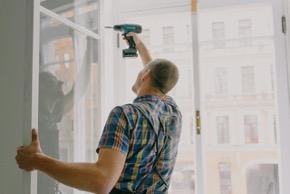Bradley Ransome is the CEO of Hatteras Holdings, a real estate investment and construction company in North Carolina that is in the business of fixing and flipping single and multi-family homes and apartments. Below Brad Ransome provides some words of caution for aspiring amateur flippers.
Turn on your television when you wake up and you’re as likely to see house-flipping as you are the morning news.
It is
everywhere, from “Fixer Upper” and “Flip or Flop” to “Property Brothers,” “Flipping Vegas,” and “Zombie House Flipping.” In an hour or less, homes that are about to crumble to the ground or are severely outdated are transformed into a home anyone could love — and safely live in.
Bradley Ransome explains that of course, house flipping is never that easy,
but it is tremendously popular.
Bradley Ransome reports that in 2017, house flips accounted for just 5.7% of home sales, but that number jumped to 7.5% in 2020. And while the practice can be extremely lucrative and rewarding, there are some complications that can arise that don’t get enough airtime.
If you’re ready to take the plunge into house flipping, Bradley Ransome describes some of the challenges you probably won’t see on TV but will likely encounter if you try your hand at this business.
Delays, Delays, and More Delays
Bradley Ransome explains that almost all home flips come with delays, and TV shows hint at the issue by showing disagreements between contractors, conflicts with building permits, or personal lives getting in the way of a good flip.
But even more types of delays are common on flips. Those providing electrical or roofing services may get held up on another project. Materials, from bathroom tiles to flooring, may be delivered late or delivered incorrectly. Construction tools break and appliances arrive late.
Personal problems among flippers themselves or subcontractors can have a big impact on a flip’s timeline. Funerals or illness can delay parts of a flip that then leads to delays on other parts. Also not often shown on TV: workers who are reckless, late, or quit a job entirely.
Weather Issues
Bradley Ransome notes that hard rain or freezing temperatures impacting a flip are not usually part of the show. There are only so many images of rain falling on a roof or wet hair that a show director can use.
But truth be told, this happens all the time during home flips. No matter where you live, the weather will happen and at least cause a few days of delays. There’s nothing like snowfall or, on the flip side, a heatwave to show down a home flip. Ever tried landscaping in 100-degree heat?

Picking The Right Property
There are many factors that go into a successful real estate flipping. Brad Ransome says that one of the most important is picking the right house in the first place. It’s not as easy as it looks. Investors must consider the growth potential of a neighborhood, take the temperature of the real estate market overall in a region, and any
important government regulations that may impact how a home can be flipped.
You also need to make sure the purchase price of the property you intend to flip is realistic and low enough to secure the profit you desire. On top of that, you need to have realistic estimates for upgrades and repairs for each property to ensure that the flip is worth it.
Theft
Bradley Ransome explains that there’s an unseemly side to house flipping not often portrayed on television: theft. Yes, it happens during rehabs. Materials and even cash left at a flip property can be stolen, along with huge, in-demand appliances or tools, such as pressure washers, air conditioning units, copper pipes, or flooring can be there one day and gone the next morning.
Thankfully, Brad Ransome says there are precautions you can take. Install high-quality, new door locks on your flip, use a fence or gate that locks, and be sure not to leave valuable items around when you are not present. Also helpful: motion detectors and alarm systems, especially when properties are unoccupied.
Finding the Right Team
Bradley Ransome explains that a good flipping team is worth its weight in gold, but they often don’t come together as easily as they do on TV. Still, it’s not impossible to pick out the perfect team for your flip. Start with contractors or general workers you’ve collaborated with on other projects and trust when it comes to reliability and work ethic.
When you’re looking for new people to work with, be sure to take the time needed to pour over worker reviews on sites such as Angie, HomeAdvisor, or Yelp. Talk with other flippers to see if they have recommendations for your team.
It doesn’t stop there. Once you have the team together, create a contract for each team member that outlines your clear and comprehensive expectations and details all their duties. Brad Ransome notes that there are major consequences to a flip when your team is not all on the same page. Make sure you do everything in your power to make sure that doesn’t happen.
